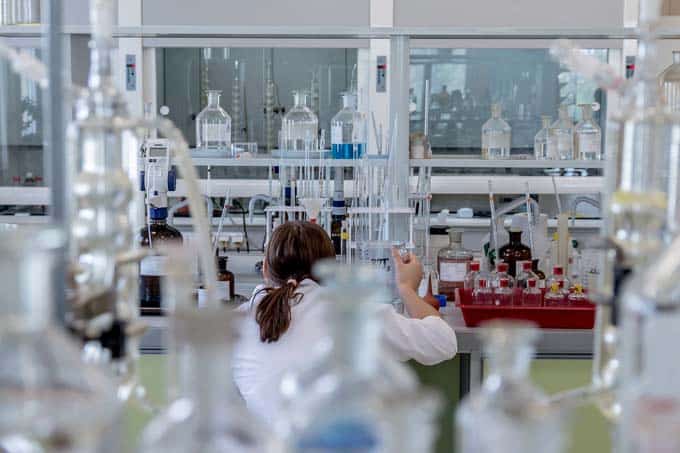Confident contract manufacturers in competition with pharmaceutical companies
Global production bottlenecks caused by the Covid 19 pandemic, as well as increasingly uncertain global supply chains in the pharmaceutical sector, have recently provided an additional boost to the already fast-growing pharmaceutical contract development and manufacturing organization (CDMO) market. Marketing Authorization Holders (MAHs), as a result, are increasingly relying on strategic partnerships with CDMOs to secure quickly needed capacity [...]

Contract manufacturer with extensive service portfolio
MAHs are pharmaceutical or research companies that have marketing authorization to market certain drugs. CDMOs can work on behalf of MAHs in the research and development and manufacture of these preparations. But as contract manufacturers grow in importance, the nature of their collaborations with pharmaceutical companies is also changing. 28% of the CDMOs surveyed already offer a comprehensive service portfolio for all types of drugs - small molecules, large molecules and advanced therapies. At the same time, 56% of the world's largest MAHs are already engaged in contract manufacturing themselves to generate additional revenue and absorb costs. "MAHs currently at the forefront of pharmaceutical drug manufacturing are increasingly relying on the technological expertise of CDMOs. This is also true in the advanced therapies market, including cell, gene and RNA therapies. This puts CDMOs in pole position to benefit from and play a significant role in shaping one of the fastest-growing markets. MAHs, on the other hand, should consider which production technologies are suitable for outsourcing and which fields they want to continue to strategically occupy and expand in the future," explains Dr. Jens Neumann, co-author of the study and Partner at Strategy&.Cooperation instead of competition
CDMOs can benefit from increased transparency, greater flexibility, faster transactions and shared incentives in strategic partnerships with MAHs, the study notes. With end-to-end services, CDMOs significantly increase their chances of strategic cooperation with pharmaceutical companies, the analysis adds. 37% of the CDMOs studied therefore offer services that cover the entire value chain, from development to the manufacture of commercial drug substances and products to packaging. 43% of the companies analyzed that focus mainly on CDMO services ("pure play") now operate as full-service providers with end-to-end services. Only 17% of them focus their activities on a single step in the value chain. CDMO businesses of MAHs as well as generic manufacturers follow this trend (38% and 36% end-to-end services, respectively). Development services are already included in the portfolio of offerings at 92% of CDMOs in North America and 84% of CDMOs in Europe, while in Asia commercial production of drug substances is the most widespread and is offered as a service by 92% of CDMOs.Increased focus on novel therapies
Neben der vertikalen Ausweitung zeigen sich CDMOs auch in der horizontalen Wertschöpfungsaktivität als strategische Partner für MAHs. Insbesondere «Pure Play»-CDMOs weiten ihr Serviceangebot auf die verschiedenen Produktionstechnologien kontinuierlich aus. Rund 38% der «Pure Play»-CDMOs sind in allen drei der genannten Bereiche aktiv, wobei 92% noch immer an der traditionellen niedermolekularen Herstellung beteiligt sind. Dies unterstreicht die Notwendigkeit, ein risikoausgewogenes Portfolio traditioneller und neuartiger Therapien aufrechtzuerhalten. Gleichzeitig bieten bereits 45% der «Pure Play»-CDMOs Dienstleistungen im Bereich von neuartigen Therapien an (im Vergleich zu 34% sämtlicher CDMOs innerhalb der Studie), und sind damit federführend im mit Abstand wachstumsstärksten Marktsegment. «Strategische Allianzen sind ein wichtiger Schlüssel für MAHs und CDMOs, um neue Produkte einzuführen und sich langfristig am Markt zu behaupten. Voraussetzung hierfür ist der kritische Blick auf die eigene Gesamtstrategie, der auch die Wertschöpfungskette, Produktionstechnologien, Dienstleistungen und Standorte einbeziehen sollte. CDMOs sollten einen Fokus darauf legen, ihren Kunden ganzheitliche und effiziente Lösungen sowie Qualitätsprodukte anzubieten. Auf Seiten der MAHs ist der Aufbau eines professionalisierten CDMO-Managements ebenso essenziell für den langfristigen Geschäftserfolg wie die zielgerichtete Kommunikation über die zukünftige Ausrichtung des Unternehmens an die eigenen Mitarbeitenden», schliesst Dr. Jens Neumann. Source: PwCThis article originally appeared on m-q.ch - https://www.m-q.ch/de/selbstbewusste-auftragsfertiger-im-wettbewerb-mit-pharmafirmen/









